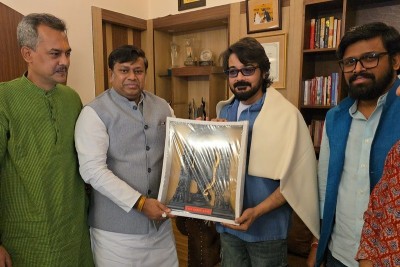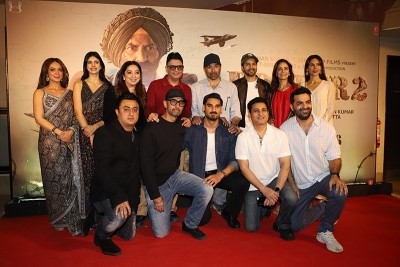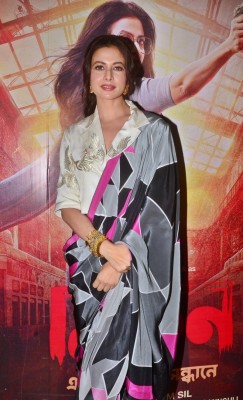
Chiranjit Chakraborty: Award winning Bengali films can make us proud but won't drive industry
Veteran actor-MLA Chiranjit Chakraborty plays a significant role in Pathikrit Basu's upcoming film Dabaru, which is based on the life of Grandmaster Surya Sekhar Ganguly. In a candid chat at his South Kolkata residence, Chakraborty speaks to IBNS correspondent Souvik Ghosh on the film, chess and more ahead of the film's release on May 10
Q. You call yourself choosy when it comes to work. What prompted you to work in Dabaru?
A. The subject. No one ever thought of making a film on chess. I liked the subject. I wondered how a film can be made on chess because this particular game is not visibly entertaining to all. But since the film is based on the life of a genius (Grandmaster Surya Sekhar Ganguly), it has turned out to be interesting. I liked it when I read the script.
Q. After working for decades, what becomes the deciding factor for you to opt for a film?
A. All aspects of a film, actually. It's a mix of all. Production house, director, script and finally the role, all matter. I think the process is the same for all actors, nothing special about me. Having said that, I scrutinize a little bit more. This is the reason I have worked in about one-tenth of the total number of films which were offered to me over the last four decades or more. While some people believe quantity is supreme to stay relevant, for me, quality matters the most.
 Image by Avishek Mitra/IBNS
Image by Avishek Mitra/IBNS
Q. You worked with Rituparna Sengupta after a long time. How was that experience?
A. I have worked with her after a gap of 23 years in Dabaru. Ironically, she was the heroine in my maximum number of films. I have known her right from the beginning of her career. Over the years, Rituparna has obviously matured but her core has remained the same. I didn't have many scenes with her in this film though.
Q. This film talks about a Bengali's bravery and road to success. Do you think Bengalis lack that at present?
A. This story is about a genius which can't be made. He was born with talent. One needs to polish the skills of such talented youngsters. The technique needs to be taught. But the genius, on whom the film is based, plays with his own technique. He follows an unconventional method, which can't be taught unlike in Chaamp where Dev needed to be taught with several techniques and probable situations.
Q. "The world forgets the ordinary but always remembers the exception," you were heard saying this line in the trailer. Do you believe the Bengali film industry, which you have served for decades, is lacking the exceptional works?
A. No, I don't think so. I don't agree with what Anurag Kashyap said. I feel Tollywood is lacking the number of single screen theatres unlike other industries like in South India. Only 40 single screen theatres now exist as compared to around 750 in my primetime. How will a film work in about 30-40 theatre houses? The Bengali audience doesn't go to multiplexes because they are afraid and shy of mall culture. The crowd, which watches films like Beder Mey Josna, doesn't go to the mall or wear branded clothes or spend 400 bucks even if they are capable. The films don't get returns at low priced tickets, which exist in the single screen theatres like Radha Studio or Nandan. The crisis is ongoing.
Dev, Jeet became stars because of the existing theatre houses during their initial days when films like Paglu, Khokababu used to work. They wouldn't have become stars had they joined the industry now. A star can't be made in only 40 theatre houses. Bombay (Mumbai) or the South (South India) do not face this problem. A star, which the industry lacks now, is needed in a film. With the change in nature of Bengali films now, a star is deconstructed and moulded into an actor. Now all actors' films run in the Bengali film industry. Films like Chotushkone, Bariwali can't give birth to stars, no matter how great those films are. Actors can't drive a film, for that we need stars.
Q. Have you ever drawn the government's attention to these crises since you also hold a position (lawmaker)?
A. No need. Why would the government invest into something that is not profitable? It's a loss making business. No use. The government is getting the revenues from the investment into the Technician Studio only due to the daily soaps. The industry is thriving only based on daily soaps. Films are no longer the driving force of the Bengali industry.
Q. Do you feel a medium like OTT would have helped you to play diverse roles in your primetime?
A. Diverse roles means he is not a star. A good or character actor can play diverse roles. This is why stars don't venture out into OTT much. How much do we see Bumba (Prosenjit Chatterjee), Dev on OTT? The busy stars do not venture out into that space. Even in Hindi, Manoj Bajpayee works on OTT but not Shah Rukh Khan or Salman Khan. Secondly, there is hardly any chance of Bengali OTTs to work. If the Bengali series had really worked, the OTT platforms wouldn't have given so much discounts at regular intervals (laughs). Bengalis overall can't afford to spend so much money on phones, OTT platforms and a cable connection at home. Now if we go to pan-India or international levels where the audience have android phones in hand, they won't consume Bengali content.
Q. Other regional films or series are watched across the country with subtitles, so why not Bengali projects? Are we also lacking in quality?
A. We won't be able to make such quality films because we lack the budget. Everything is connected to economics. Whatever we are making in this budget looks so poor, that it won't be bought by any platform. Subtitles come later. We can feel proud of Bengali films which are winning National Awards but that won't earn money and run the industry. While the South is still catering to the mass, our industry started making only 'better films' leading to this dire situation.
 Image by Avishek Mitra/IBNS
Image by Avishek Mitra/IBNS
Q. In a previous interview, you claimed filmmakers like Mrinal Sen or Tarun Majumdar didn't cast you. However, you have worked with Rituparno Ghosh. Do you think your mainstream background prevented them from casting you?
A. They didn't feel like casting me. They didn't consider me as an actor. I will not make excuses. Honestly, they didn't consider me. Simple. I was offered roles by Rina-di (Aparna Sen) and Tarun Majumdar but I turned them down because I felt those were not up to the mark. I don't consider myself as a good actor but managed to survive in the industry due to the love from the audience.
Q. In the current Lok Sabha elections, we are witnessing the normalisation of abusive words during campaigns, starting right from the highest rung of leaders. How do you see this?
A. If someone abuses me, I will respond with Jesus Christ's line "Father, forgive them, for they know not what they do". I neither abuse anyone nor support it. I have seen Dev maintaining dignity in campaigns. Recently, I saw him hugging a man for raising the Jai Shri Ram slogan at him. A good technique (laughs). One has to choose his way. Currently we are going through such a period where such things are becoming common.
(Images by Avishek Mitra/IBNS)
Support Our Journalism
We cannot do without you.. your contribution supports unbiased journalism
IBNS is not driven by any ism- not wokeism, not racism, not skewed secularism, not hyper right-wing or left liberal ideals, nor by any hardline religious beliefs or hyper nationalism. We want to serve you good old objective news, as they are. We do not judge or preach. We let people decide for themselves. We only try to present factual and well-sourced news.







